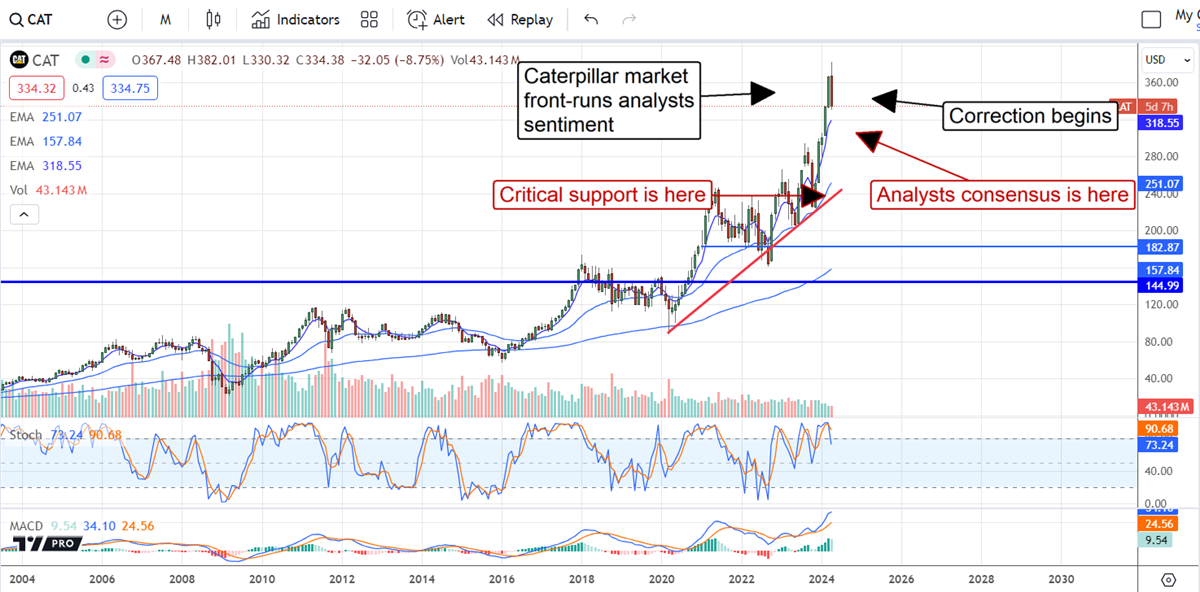Caterpillar's Market Reset Isn't Over: Get Ready for Lower Prices The market’s reaction to Caterpillar’s (NYSE: CAT) Q1 results and guidance proves that the correction in price action is not over. The news isn’t bad, but tepid and weaker than expected, causing a sentiment reset. Analysts rate the stock at Hold and lifted their price targets steadily over the last year, but the market front-ran the trend, setting the stock up for today’s decline. Because the market for Caterpillar stock is still 10% above the analysts' consensus reported by Marketbeat, it will likely fall another 10% at least, retesting support at the 150-day EMA, if not lower price points. The market’s reaction to Caterpillar’s (NYSE: CAT) Q1 results and guidance proves that the correction in price action is not over. The news isn’t bad, but tepid and weaker than expected, causing a sentiment reset. Analysts rate the stock at Hold and lifted their price targets steadily over the last year, but the market front-ran the trend, setting the stock up for today’s decline. Because the market for Caterpillar stock is still 10% above the analysts' consensus reported by Marketbeat, it will likely fall another 10% at least, retesting support at the 150-day EMA, if not lower price points.
[content-module:DividendStats|NYSE:CAT]However, Caterpillar is still a solid dividend-paying stock. At lower price points, it will offer a better value, verging on deep value, and pay a higher yield. The dividend is worth about 1.5%, with shares trading near $360, so the increase won’t be substantial, but investors need every edge they can get. The payout is reliable, and the distribution is growing, so there is also some leverage to be gained. The payout ratio is a low 24%, and the balance sheet is healthy, so additional increases are expected to match the 8% CAGR now posted. If you think AI is big, then you have got to check out something I call Imperium…
By my calculations, it's set to grow 320,000% in three years. (You can see my calculations here.) Watch my video for all of the details Caterpillar’s Global Presence and Diversification Drive Results Caterpillar had a rough quarter in Q1, with demand offsetting price increases to leave revenue at $15.8 billion and down 0.6% compared to last year. The revenue is relatively flat compared to last year, but $120 million short of the analyst consensus, forecasting slight growth. Energy & Transportation was the strongest segment, with an increase of 7% offset by a 7% decline in Resource Industries and a 5% decline in Construction Industries. Geographically, North America led with growth of 7%, followed by a 2% gain in Latin America, offset by a 5% contraction in Asia and a 17% contraction in Europe. Margin is the bright spot in the report, but there is a one-off in play, and the news was not enough to sustain upward momentum in the stock price. The GAAP operating margin widened by 510 basis points to 22.3% to drive record earnings. The GAAP and adjusted earnings include a business divestiture, but strength is also present when accounting for the sale. The adjusted earnings grew 14% on leverage gained by pricing and efficiency efforts to $5.60, 47 cents above the consensus. Accounting for the sale, adjusted earnings are up 7% and 13 cents above forecast. Guidance is another sticking point for today’s market. The guidance expects Q2 to see contraction and flat full-year results. However, the takeaway is that Q2 will be a trough in the contraction, leading to growth in the back half that is expected to accelerate next year. Caterpillar is Building Leverage for Investors Caterpillar’s results and guidance are tepid but sufficient to sustain company health and an outlook for robust capital returns. The dividend yield isn’t robust on its own; at 1.5%, it is only slightly better than the S&P 500 average, but share repurchases compound it. The company aggressively repurchased shares and lowered its count by 4.3% average at the end of Q1. Repurchases are expected to remain robust in 2024 and may grow over time. [content-module:CompanyOverview|NYSE:CAT]The price action in CAT stock is unfavorable, but the uptrend remains intact. The caveat for investors is that the uptrend took the price action significantly above fair value, and the correction could easily do the opposite. Critical support targets exist at $318, $287, and $243. The first two targets bracket the analysis consensus and will likely provide solid support. If not, a move to $243 is likely. The next catalyst for CAT is the FOMC rate cut. The FOMC rate cut is expected to signal an economic pivot that unfetters global industrial activity. The problem today is that inflation and persistently hot labor data suggest the FOMC will not cut rates until late this year, if they cut in 2024 at all. 
Written by Thomas Hughes Read this article online › Recommended Stories: |
No comments:
Post a Comment